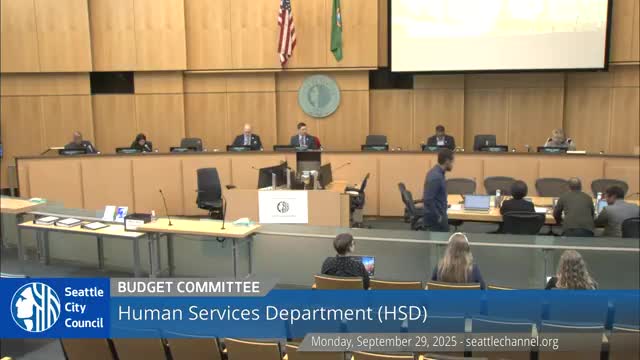Human Services proposes new shelter beds, emergency rental assistance and a reserve amid federal uncertainty
September 30, 2025 | Seattle, King County, Washington
This article was created by AI summarizing key points discussed. AI makes mistakes, so for full details and context, please refer to the video of the full meeting. Please report any errors so we can fix them. Report an error »

The Seattle Human Services Department told the Select Budget Committee on Sept. 29 that the mayor’s 2026 proposed budget would expand shelter capacity and rental‑assistance funding while creating a contingency reserve to address possible federal cutbacks.
Director Tanya Kim said the budget includes $7.8 million in ongoing general‑fund support to open 155 additional shelter beds, covering site identification, startup and three months of operating costs. Kim said the city intends those shelters to include wrap‑around supports such as case management, housing navigation and behavioral‑health services.
The department also proposed $4 million in ongoing emergency rental assistance —bringing the city’s total in 2026 to $11.5 million—aimed at three objectives: prevent imminent homelessness from financial hardship, intervene in active evictions, and support households showing early signs of housing instability. Kim said the program is designed to include case management so rental payments are paired with supports that promote long‑term stability.
Because the federal government’s stance on certain homelessness and housing funding was described by department staff as uncertain, HSD’s budget includes a one‑time reserve of $9.35 million to rapidly backfill shelter and emergency housing needs if outside funding is reduced.
Kim said the majority of Seattle’s homelessness investments still flow to the King County Regional Homelessness Authority (KCRHA) and that some site selection and procurement functions will remain with KCRHA. Council members asked for timelines and details about two congregate shelter sites funded in 2025 and about how the city will track outcomes and accountability for large pass‑through contracts.
Kim also described a planned pilot between the Downtown Seattle Association and Community Solutions to test a low‑barrier, outreach‑centered shelter model downtown, funded through the mayor’s proposal.
The proposed expansions are tied to council action on the mayor’s budget and, for some items, voter‑contingent changes to business tax revenues; council members asked the department for continuing outcome reporting and clearer data on shelter flows, placements and long‑term housing outcomes.
Director Tanya Kim said the budget includes $7.8 million in ongoing general‑fund support to open 155 additional shelter beds, covering site identification, startup and three months of operating costs. Kim said the city intends those shelters to include wrap‑around supports such as case management, housing navigation and behavioral‑health services.
The department also proposed $4 million in ongoing emergency rental assistance —bringing the city’s total in 2026 to $11.5 million—aimed at three objectives: prevent imminent homelessness from financial hardship, intervene in active evictions, and support households showing early signs of housing instability. Kim said the program is designed to include case management so rental payments are paired with supports that promote long‑term stability.
Because the federal government’s stance on certain homelessness and housing funding was described by department staff as uncertain, HSD’s budget includes a one‑time reserve of $9.35 million to rapidly backfill shelter and emergency housing needs if outside funding is reduced.
Kim said the majority of Seattle’s homelessness investments still flow to the King County Regional Homelessness Authority (KCRHA) and that some site selection and procurement functions will remain with KCRHA. Council members asked for timelines and details about two congregate shelter sites funded in 2025 and about how the city will track outcomes and accountability for large pass‑through contracts.
Kim also described a planned pilot between the Downtown Seattle Association and Community Solutions to test a low‑barrier, outreach‑centered shelter model downtown, funded through the mayor’s proposal.
The proposed expansions are tied to council action on the mayor’s budget and, for some items, voter‑contingent changes to business tax revenues; council members asked the department for continuing outcome reporting and clearer data on shelter flows, placements and long‑term housing outcomes.
View full meeting
This article is based on a recent meeting—watch the full video and explore the complete transcript for deeper insights into the discussion.
View full meeting
